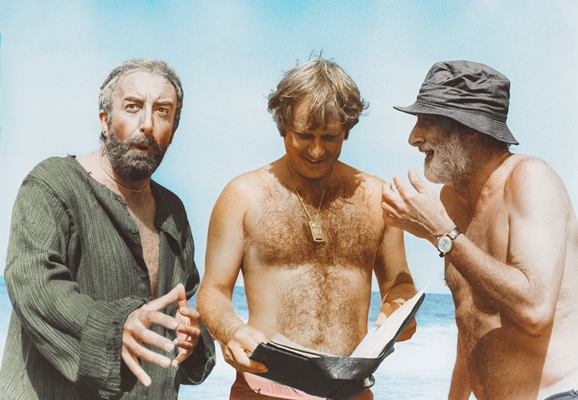
Peter Medak is, by all measures, a successful director, with a career of nearly 50 years in film and television that includes The Ruling Class, which garnered an Academy Award nomination for Peter O’Toole, and the underrated horror classic The Changeling. One would assume he would be satisfied with his career and his breadth of work.
Unfortunately, there was one film that sat unreleased for 11 years before being unceremoniously dumped onto home video, the pirate comedy Ghost in the Noonday Sun (1974). The making that movie and his relationship with its quixotic star, Peter Sellers, has haunted him for decades, so in the documentary The Ghost of Peter Sellers, he recounts his experience while talking to the few living participants left in the making of the flop.
What could have been a Spinal Tap–like absurdist comedy or an insider’s look into the sometimes tortuous process of filmmaking ends up feeling more like score settling. There is very little new information on Sellers, who was clearly a troubled, difficult, and abusive man. This is stuff that anyone who has a passing interest in film history already knows. We just learn more details regarding his abuses.
For Medak in 1973, this was shocking, as he was friends with the actor and, like many others, deeply admired Sellers’s genius. But in 2020, it simply doesn’t add anything new. Anecdotes that should be treated as humorous and audacious in their implausibility, such as the fact that Sellers faked a heart attack to get off the shoot so he could have lunch with Princess Margaret, aren’t funny because the incredulity and anger and hurt that Medak still carries.
Eventually we learn the core of Medak’s insecurities, and it’s heartbreaking. A child of the Holocaust (he was born in Hungary), he lived a lifetime’s worth of tragedy in his first 30 years. He feels responsible for not protecting his family even though he was only a boy, and he absolutely feels responsible for his first wife’s suicide. He’s a self-described “sponge of guilt-ridden feelings.” So the need to complete the film and not fail was deep and psychological.
The necessity to rehash the experience and get some closure may be therapeutic only to Medak though. Watching him confront producer John Heyman regarding a letter the latter wrote 47 years ago does Medak no favors. And footage from Ghost confirms his worst fears. It is excruciatingly unfunny: full of mugging, fast-action sword fights, and waaaay over-the-top acting. The film clips confirm that, yes, the film should never have been made.
Regardless of Sellers’s behavior, there were other problems: the ongoing last minute re-writing of the script, filming at sea (notoriously difficult because of lighting issues, for one), and a ship retrofitted for the movie that crashed before shooting began because its captain was blind drunk. The Ghost of Peter Sellers is only marginally better: humorless, shallow, and dominated by a one-dimensional quest for the justification of a decades-old failure.
















Leave A Comment